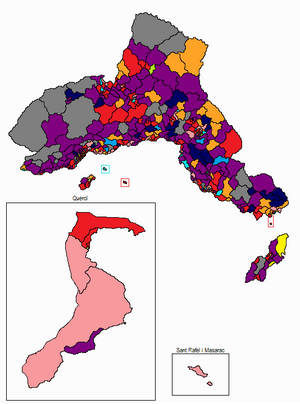2019 Rodavese general election: Difference between revisions
Thrawsonia (talk | contribs) No edit summary |
Thrawsonia (talk | contribs) No edit summary |
||
| (10 intermediate revisions by the same user not shown) | |||
| Line 87: | Line 87: | ||
| after_election = [[Marc Ferrer]] | | after_election = [[Marc Ferrer]] | ||
| after_party = UNO | | after_party = UNO | ||
| map = [[File:Constituencies | | map = [[File:Upgraded Current Constituencies 3.png|300px]] | ||
| map_caption = A map presenting the results of the election, by party of the MP elected from each constituency. | | map_caption = A map presenting the results of the election, by party of the MP elected from each constituency. | ||
| map2 = [[File:Svgfiles 2022-02-18-19-28-05-845502-2042131609286341393.svg|300px]] | |||
| map2_caption = Composition of the Generalitat after the election. | |||
}} | }} | ||
| Line 95: | Line 97: | ||
Following the [[2015 Rodavese general election|2015 election]], the [[National Worker's Union]] (UNO) served as the senior member of the centre-left governing coalition with the [[Democratic Republicans]], with confidence and supply support from several other left-leaning parties. It was the first election contested by [[Amàlia Gaià]] following a [[vote of confidence]] after the resignation of [[Pere Martí]] in 2017 amidst the [[XXXX-Military Supply Affair]]. The opposition was headed by the centrist [[Democratic Movement]], lead by [[Francesc Pujols]], but with low support amongst the rest of the opposition that was predominantly centre-right, primarily with the party [[Leading Our Future]] (LNF). | Following the [[2015 Rodavese general election|2015 election]], the [[National Worker's Union]] (UNO) served as the senior member of the centre-left governing coalition with the [[Democratic Republicans]], with confidence and supply support from several other left-leaning parties. It was the first election contested by [[Amàlia Gaià]] following a [[vote of confidence]] after the resignation of [[Pere Martí]] in 2017 amidst the [[XXXX-Military Supply Affair]]. The opposition was headed by the centrist [[Democratic Movement]], lead by [[Francesc Pujols]], but with low support amongst the rest of the opposition that was predominantly centre-right, primarily with the party [[Leading Our Future]] (LNF). | ||
Leading Our Future won a plurality of seats with 145, a large increase from the 75 they had won in 2015. The UNO had lost much support, much being due to the [[New Left]] bloc formed in 2014 of several left-wing parties. The right-wing populist party the [[Rodavese Freedom Party]] (PLR) won 28 seats, up from their previous 11 in 2015. The Democratic Movement, shortened from the [[Union for Rodavese Democracy]] won 52 seats, their lowest total since the [[2001 Rodavese general election|Vinga landslide of 2001]]. | Leading Our Future won a plurality of seats with 145, a large increase from the 75 they had won in 2015. The UNO had lost much support, much being due to the [[New Left]] bloc formed in 2014 of several left-wing parties. The right-wing populist party the [[Rodavese Freedom Party]] (PLR) won 28 seats, up from their previous 11 in 2015. The Democratic Movement, shortened from the [[Union for Rodavese Democracy]] won 52 seats, their lowest total since the [[2001 Rodavese general election|Vinga landslide of 2001]]. After the first round, LNF had majorities in 111 seats with pluralities in 29, while the UNO had majorities in 120 seats with pluralities in 19. After the second round, the LNF finished with 145 seats to the UNO's 134. | ||
The centre-left bloc of the UNO, the Democratic Republicans, the New Left, [[The 17]], and the [[Green Left]] failed to gain enough seats to hold the majority in government with 203 seats, reduced from a comfortable combined majority in 2015. Despite the centre-right bloc of LNF, the PLR, and the [[National Alliance]] making large gains with 194 seats and a coalition agreement with the [[Beoist Union]], they fell short of the 231 needed to govern on their own as well, positioning the traditionally centre-right Democratic Movement as a [[kingmaker party]]. Gaià resigned shortly after the election results of the second round were released, although without a government she would remain Acting Prime Minister until a coalition agreement was reached. | The centre-left bloc of the UNO, the Democratic Republicans, the New Left, [[The 17]], and the [[Green Left]] failed to gain enough seats to hold the majority in government with 203 seats, reduced from a comfortable combined majority in 2015. Despite the centre-right bloc of LNF, the PLR, and the [[National Alliance]] making large gains with 194 seats and a coalition agreement with the [[Beoist Union]], they fell short of the 231 needed to govern on their own as well, positioning the traditionally centre-right Democratic Movement as a [[kingmaker party]]. Gaià resigned shortly after the election results of the second round were released, although without a government she would remain Acting Prime Minister until a coalition agreement was reached. | ||
Latest revision as of 17:36, 4 May 2022
| |||||||||||||||||||||||||||||||||||||||||||||||||||||||||||||||||||||||||||||
All 460 seats in the Generalitat | |||||||||||||||||||||||||||||||||||||||||||||||||||||||||||||||||||||||||||||
|---|---|---|---|---|---|---|---|---|---|---|---|---|---|---|---|---|---|---|---|---|---|---|---|---|---|---|---|---|---|---|---|---|---|---|---|---|---|---|---|---|---|---|---|---|---|---|---|---|---|---|---|---|---|---|---|---|---|---|---|---|---|---|---|---|---|---|---|---|---|---|---|---|---|---|---|---|---|
| Opinion polls | |||||||||||||||||||||||||||||||||||||||||||||||||||||||||||||||||||||||||||||
| Turnout | 74.30% ( 68.20% ( | ||||||||||||||||||||||||||||||||||||||||||||||||||||||||||||||||||||||||||||
| |||||||||||||||||||||||||||||||||||||||||||||||||||||||||||||||||||||||||||||
 A map presenting the results of the election, by party of the MP elected from each constituency. | |||||||||||||||||||||||||||||||||||||||||||||||||||||||||||||||||||||||||||||
 Composition of the Generalitat after the election. | |||||||||||||||||||||||||||||||||||||||||||||||||||||||||||||||||||||||||||||
| |||||||||||||||||||||||||||||||||||||||||||||||||||||||||||||||||||||||||||||
The 2019 Rodavese general election were held on 10 and 17 January 2019, to elect the 15th Generalitat of the Kingdom of the Rodaves. All 460 seats in the Generalitat were up for election.
Following the 2015 election, the National Worker's Union (UNO) served as the senior member of the centre-left governing coalition with the Democratic Republicans, with confidence and supply support from several other left-leaning parties. It was the first election contested by Amàlia Gaià following a vote of confidence after the resignation of Pere Martí in 2017 amidst the XXXX-Military Supply Affair. The opposition was headed by the centrist Democratic Movement, lead by Francesc Pujols, but with low support amongst the rest of the opposition that was predominantly centre-right, primarily with the party Leading Our Future (LNF).
Leading Our Future won a plurality of seats with 145, a large increase from the 75 they had won in 2015. The UNO had lost much support, much being due to the New Left bloc formed in 2014 of several left-wing parties. The right-wing populist party the Rodavese Freedom Party (PLR) won 28 seats, up from their previous 11 in 2015. The Democratic Movement, shortened from the Union for Rodavese Democracy won 52 seats, their lowest total since the Vinga landslide of 2001. After the first round, LNF had majorities in 111 seats with pluralities in 29, while the UNO had majorities in 120 seats with pluralities in 19. After the second round, the LNF finished with 145 seats to the UNO's 134.
The centre-left bloc of the UNO, the Democratic Republicans, the New Left, The 17, and the Green Left failed to gain enough seats to hold the majority in government with 203 seats, reduced from a comfortable combined majority in 2015. Despite the centre-right bloc of LNF, the PLR, and the National Alliance making large gains with 194 seats and a coalition agreement with the Beoist Union, they fell short of the 231 needed to govern on their own as well, positioning the traditionally centre-right Democratic Movement as a kingmaker party. Gaià resigned shortly after the election results of the second round were released, although without a government she would remain Acting Prime Minister until a coalition agreement was reached.
After months of negotiations the Democratic Movement had agreed to form a government with the centre-left bloc, marking only the second time since the Constitution of 1968 that the most popular party was not in government. With Gaià's resignation, and Justice Minister Marc Ferrer winning comfortably in the UNO's subsequent leadership election, he was elected Prime Minister by the new coalition government on 22 May 2019.





